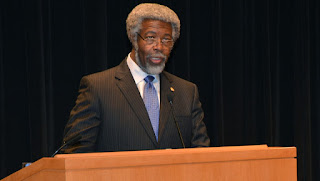 |
| Image Source: American Association for the Advancement of Science (link below) |
Topics: Diversity, Diversity in Science, Economy, Education, Science, STEM, Research
It's easy to bash millennials until you're in two classrooms with them. I taught Algebra, Pre Calculus and Physics between two campuses in Texas: Hutto and Manor High Schools respectively.
They're a lively bunch; probably better than an Expresso if you "really" want to wake up (or, even if you don't).
It's nice when someone of Dr. Gate's stature recognizes and encourages it as well.
I have a selfish interest encouraging this observed collaborative spirit as well: I'd like to retire with the store "fully functional" on my departure from the workforce (one day).
I thoroughly enjoyed my "coming of age" in the 1980s, but I do envy millennials - this is your time: a time of both great perils to be solved and great wonders to be discovered. It depends on what you're willing to step forward and emphasize that will shape the future, quite literally for the entire planet and species.
The U.S. R&D enterprise needs more support, but millennials, born near the end of the 20th century, share characteristics that will serve them well if they become scientists, S. James Gates Jr. said at the AAAS-Hitachi lecture.
The United States used science and technology to great economic benefit after World War II and can continue to "master the innovation cycle" by drawing on the collaborative nature of millennials who started to come of age as the century turned, a leading physicist told a AAAS gathering recently.
S. James Gates Jr., a theoretical physicist at the University of Maryland and self-described policy wonk, shared his thoughts on the future of "big science" and the challenges the nation faces as it responds to increased scientific and economic competition from abroad.
He noted that millennials, those born between 1982 and 2000, now make up a larger percentage of the U.S. population than the baby boomers born after World War II. According to the Census Bureau, millennials number 83.1 million and account for more than one quarter of the U.S. population while the boomers number 75.4 million. The millennial generation also is more diverse, Gates said, offering the possibility that creative new approaches to science may emerge.
 |
| From Forbes: "Why You Can't Ignore Millennials," Dan Schawbel |
The millennials show a willingness to embrace dramatic social shifts, are comfortable with the new technologies that have connected us via the Internet, and exhibit "a far more collaborative" streak than some previous generations, Gates said. That willingness to work in groups, share information and ideas, and collaborate on projects is highly compatible with the methods and goals of science, and Gates said it is something to be admired and fostered.
AAAS: Collaborative Spirit of Millennial Generation May Benefit Big Science, Earl Lane
Comments